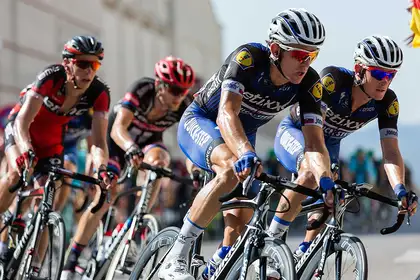
Elite cyclists continue to make news headlines, with "non-negative" drug tests casting a shadow over the sport.
By Professor Steve Stannard.
The sport of cycling has suffered another blow, in the eyes of the public at least, with a "non-negative" drug test from four-time Tour de France champion and Team Sky rider Chris Froome. It's worse still for Team Sky, which has been roundly criticised over now-retired Tour Champion Bradley Wiggins' use of a legal, but powerful and potentially performance-enhancing anti-inflammatory during his tour-winning streak. In Froome's case, it seems he's taken too many puffs of his permitted asthma medication, and that's pushed him over the legal limit.
In both situations, but unlike the fiasco of Russian athletics, neither athlete is being accused of taking a drug simply to improve performance. Rather, the implication is that the riders are making use of a personal health-related condition to use a drug that also happens to have performance-enhancing effects. In Wiggins' case, it was the powerful corticosteroid triamcinolone prescribed for his hay fever. In Froome's case, it's salbutamol, a B2 agonist and the main ingredient of a common asthma medication.
If an athlete does need medication for hay fever, asthma, or any other health-related conditions, and that medication is on the banned list, they can apply for Therapeutic Use Exemption (TUE), which their doctor then signs. This TUE notifies the drug testers that they are allowed that drug.
The first question that needs to be asked about a TUE is whether the drug is really needed, especially if it also happens to have a performance-enhancing side effect. The second question is how much of that drug they actually need to alleviate the health-related problem.

Professor Steve Stannard.
A "non-negative" test result describes a situation where the athlete is shown to have a level of a TUE-permitted drug in their body that is far higher than expected, higher than would be the case if the drug was taken only for health purposes.
Team Sky proudly stated some years ago that their success was put down to "marginal gains". This came from their sport scientists studying every detail of their athletes' training, diet and equipment and making changes to these to produce a series of small performance gains that added up to create a winning margin. The cynics have noted that probably also included obtaining TUEs when they were not warranted. Of course, this is not in the spirit of sportsmanship, even if it is "legal" in the eyes of the drug testing bodies and sporting organisations.
For now, the question is whether salbutamol, at the level at which Froome seems to have been taking it, can be considered performance enhancing.
The weight of research evidence does not indicate that salbutamol inhaled at therapeutic (health) levels has performance-enhancing effects. However, there are some well-conducted studies that do show, in non-asthmatics, oral administration of this medication at higher doses can improve endurance performance.
What the research literature does show is that athletes and sports people in general are prescribed asthma medication at much greater rates than the general population. This is explained away through the diagnosis of a condition known 'exercise-induced asthma'. Exercise, sometimes in combination with environmental conditions such as pollution or cold air, triggers inflammation of the airways resulting in reduced lung function (asthma), and subsequently a drop in physical performance. This is Froome's rationale for taking salbutamol — and indeed he's apparently taken it for many years for this purpose.
That athletes are prescribed at greater rates than the general population should ring alarm bells for the drug testers and medical fraternity, because at the very least it suggests inadequate diagnostic criteria or testing. Few GPs have the time or resource to test lung function during exercise; they are reliant upon resting tests and descriptions of symptoms from patients.
Breathlessness experienced during exercise may be a result of many factors, including asthma, heart disease, or just a set of healthy lungs working at their physiological limit. Taking medication such as salbutamol to improve lung function and thus performance in the latter situation could be construed by some as akin to taking a drug to increase red blood cell count or boost natural testosterone levels. Neither of the latter are tolerated in sport.
There is not going to be a clear or good outcome for Froome or Team Sky, but while cyclists or any other athletes play this game for marginal gains on the very edge of the sportsmanship spectrum, there are no winners.
Professor Steve Stannard is Professor of Exercise Physiology in the School of Sport, Exercise and Nutrition. This opinion piece was originally published in the Herald on Sunday.